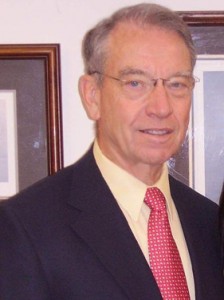
US Senator asks why Govt would award $2 mil “PTSD Research” grant to Psychiatrist known for back-door Pharma funding
Grassley is questioning the award of a five-year grant worth almost $402,000 annually to investigate “psycho-biological” risk factors for post-traumatic stress disorder to Dr. Charles Nemeroff at the University of Miami (Fla.) School of Medicine.
Nemeroff was the chairman of the psychiatry and behavioral sciences department at Emory University in Atlanta and leading a $9.3 million NIH-funded study on depression when it was uncovered that he had received more than $800,000 from drug manufacturer GlaxoSmithKline for 250 speaking engagements between January 2000 and January 2006 and other income that he had not disclosed.



